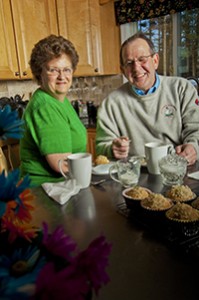Just as Dana-Farber tailors treatment and support to children and young adults, the Older Adult Leukemia Program ̶ a specialized, clinical service ̶ addresses the other end of the spectrum: adults who are 65 and older, and have blood cancer such as leukemia or other bone marrow disorders.

The program offers the expertise of Gabriela Motyckova, MD, PhD, and Jane Ann Driver, MD, MPH, a geriatrician who is

also a medical oncologist. Driver conducts a comprehensive geriatric assessment that includes measuring a patient’s “functional age” and life expectancy. She helps guide the choice of therapy, aiming to minimize side effects and enhance quality of life.
If you are an older adult, here are some reasons to consider a special type of care for your cancer.
- Cancer may behave differently in an older body than a younger one. Cancer cells tend to have more genetic damage in older patients, which can affect how they respond to treatment and the rate of remission.
- Cancer may accompany other health issues that come with age, such as heart disease, high blood pressure or arthritis, so the risk of complications is greater.
- Your decisions about cancer treatment may be different at this stage of life than they would have been when you were younger.
- Your “functional age” may differ from your calendar age. If you are 70, you may have the activity level of a younger person or an older person, and your treatment should be tailored accordingly.
- You may need a treatment plan that includes physical therapy, home visits, or medication management.
 Choose a center that offers a comprehensive approach, including social work, nutrition, medical specialties referrals, symptom assessment, and where oncologists work hand-in-hand with geriatricians. Make sure your cancer care is well coordinated with your primary care physician and your medical needs.
Choose a center that offers a comprehensive approach, including social work, nutrition, medical specialties referrals, symptom assessment, and where oncologists work hand-in-hand with geriatricians. Make sure your cancer care is well coordinated with your primary care physician and your medical needs.
